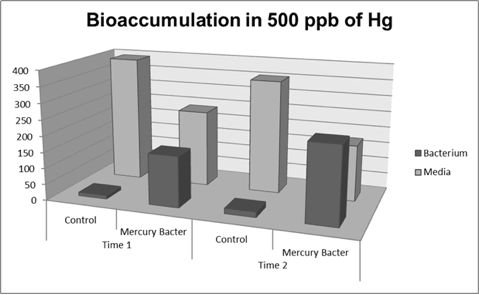Part:BBa_K346004:Experience
This experience page is provided so that any user may enter their experience using this part.
Please enter
how you used this part and how it worked out.
User Reviews
|
•••••
UFAM_Brazil 2014 |
We used this biobrick part to build a Hg bioacumulator with bidirectional promoter regulated by MerR! This part worked so well, we have incredible results! Thanks, Peking! The graph represented on Figure 1 shows the amount of Hg in supernatant (LM medium recovered) and in [http://2014.igem.org/Team:UFAM_Brazil Mercury Bacter] (DH5-alpha transformed with BBa_K1355003 at the time 1 (01:30 hours of bacteria incubation) and time two (03:00 hours of bacteria incubation); Figure 6: Metal binding peptide activity at 500 ppb in time 1 and 2 It can be observed that the amount of Hg in Mercury Bacter bioaccumulator, increases according to the time of incubation. In the 500 ppb Hg concentration the control bacterium just accumulated 4% of total Hg amount. Instead, Mercury Bacter accumulated 58% of total Hg amount in just 03:00 hours of incubation!!! This is so awesome! Check it out our Experience in extended version and the Desing [http://2014.igem.org/Team:UFAM_Brazil Mercury Bacter] of the Hg biosensor! |
Construction of BBa_K346004
Just as what we have done to construct the mercury Metal Binding Peptide, the entire coding region of the MBP for standard part was amplified by PCR from full length PbrR with two pairs of primers. Two of these primers encoded a three-residue bridge, SSG, which does not occur in PbrR and was added to afford some flexibility in the loop connecting the two dimerization helix. The two PCR products were digested with EcoR I / BspEI, or BspEI / Pst I and cloned into EcoR I / Pst I -digested pSB1K3 bybone step (Fig above), which was verified by DNA sequencing. Then the RBS and terminator was prefixed and suffixed.
Based on the similar method, MBP-His6 was constructed by using two different pairs of primers, which was used for western blotting. The two PCR products were digested with Nde I / BspEI, or BspEI / Xho I and cloned into Nde I / Xho I -digested pET 21a backbone which contains a six his tag downstream. Cloning was verified by DNA sequencing.
Expression Experiment and Function Test:
To test the function of this part, both expression experiment and function test is necessary. We have verified the size of the expressed proteins with SDS-PAGE and Western blotting. Besides, to test the efficiency of mercury binding, we also carried out the function test with ICP-AES
Results:
Expression of proteins
The plasmid PET21a-MBP was transformed to E.coli strain BL21. Both induced cells and uninduced cells(as control) were centrifuged to get the cytosol, the periplasm and the membrane separated. The SDS-PAGE and Western blotting of the expressed proteins showed that induced cells expressed an identical IPTG-inducible protein at the proper place with the size of ~12kD as expected.
The specific band in western blotting for his-tag fused MBP of about 12 kD confirmed that the MBP was expressed as expected. Considerable amount of MBP expressed in cytosol can be indicated from the result of SDS-PAGE.
Function test
Having confirmed that the protein can be expressed normally in the cytosol, We conducted the function tests experiment with ICP-AES. To test the efficiency of mercury absorption by MBP in different concentration of mercury, the concentration gradient of lead was set from 10^-7M to 10^-5M (data not shown). The results of the efficiency of different parts containing MBP(lead) was shown below. It is apparent that under the concentration of 10^-5M, there was a notable absorption of lead compared to the control.
Figure 2 Lead binding capacity of lead absorbed by bacteria with MBP expressed in different subcellular compartments cultured for ~40h in 10-5 mol/L Pb (II) medium.
User Reviews
UNIQ1bf7d97703ba4aaf-partinfo-00000001-QINU UNIQ1bf7d97703ba4aaf-partinfo-00000002-QINU




